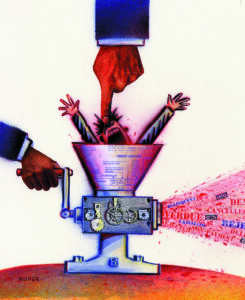The World Bank and the IMF Are Enabling the Next Crisis
A fresh global economic disaster is brewing, and the authors of world financial policy don't acknowledge their role in creating it.
The ingredients of a fresh global economic crisis are assembling, and the IMF and the World Bank are failing to acknowledge their role in creating them.
Larry Elliott, The Guardian’s economics editor, writes:
According to the IMF, global debt has risen to a record level of $152tn (£1223tn) – more than double world GDP – at a time when activity is sluggish. Collapsing commodity prices and weak demand from the west has meant growth in sub-Saharan Africa is running at half the level of population growth. Companies in the emerging world loaded up on debt during the commodity boom and are now vulnerable to rising US interest rates and any softening of the global economy. China is the most egregious example of debt being used to boost activity artificially.
[But] The argument that rising debt is fine because on the other side of ledger is an asset increasing in value is specious. The only reason the assets are rising in price is because investors are taking on more debt to buy them. At some point, the asset bubble bursts leaving the borrowers in severe problem. This was the lesson of the sub-prime crisis and it is remarkable that memories are so short.
The next big one could come from anywhere and it is good that the World Bank and the IMF are aware of the risks. Even so, there was an air of unreality about the discussions in Washington last week.
The reason was simple: there was not the slightest hint from the IMF or the World Bank that the policies they advocated during the heyday of the so-called Washington consensus – austerity, privatisation, financial liberalisation – have contributed to weak and unequal growth, with all the political discontent that has caused.
Even worse, Lagarde and Kim seemed oblivious to the fact that the Washington consensus approach is still alive and well within their own organisations. The IMF’s remedy for Greece and Portugal during the eurozone crisis has been straight out of the structural adjustment playbook: reduce public spending, cut wages and benefits, insist that state-owned enterprises are returned to the private sector, reduce minimum wages and restrict collective bargaining. Between them, the IMF and the European authorities are turning Greece into a third world country. It would be fascinating to see what sort of response Lagarde would get if she if tried talking about inclusive growth to the homeless huddled on the streets of Athens.
.
—Posted by Alexander Reed Kelly
Independent journalism is under threat and overshadowed by heavily funded mainstream media.
You can help level the playing field. Become a member.
Your tax-deductible contribution keeps us digging beneath the headlines to give you thought-provoking, investigative reporting and analysis that unearths what's really happening- without compromise.
Give today to support our courageous, independent journalists.






You need to be a supporter to comment.
There are currently no responses to this article.
Be the first to respond.